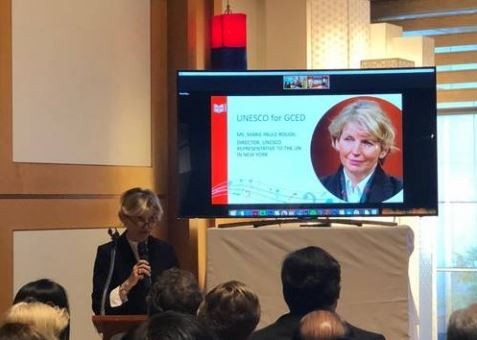
GCED Basic Search Form
Quick Search
You are here
News

New York: On 18 July 2018, at the margins of the High-level Political Forum 2018, UNESCO joined the discussion on education for sustainable development and global citizenship, held at the Permanent Mission of Korea to the United Nations.
The event was organized by the Permanent Missions of the Republic of Korea and the State of Qatar to the United Nations, the NGO Steering Committee for an International Day of Education for Global Citizenship, and supported by UNESCO New York Office, the United Nations Academic Impact and the United Nations Alliance of Civilizations.
More than 150 participants joined the gathering to celebrate the spirit of global citizenship, cultural diversity and sustainable lifestyles. The event featured interactive discussion with government officials, UN system and civil society leaders, as well as a cultural performance, which showcased music, dances and performances from different regions.
In her keynote remarks, Marie Paule Roudil stressed that educating is a multiplier for the whole 2030 Agenda for Sustainable Development, by empowering learners to be positive change actors for more peaceful and resilient societies. Ms Roudil outlined UNESCO’s activities and efforts in defining and promoting Global Citizenship Education that aims to equip learners of all ages with values, knowledge and skills that instill respect for human rights, social justice, diversity, gender equality and environmental sustainability.
Addressing the audience, Professor Jeffrey Sachs urged to scale up global investments to education to ensure that every child has an access to quality education. He called to further raise awareness about the Sustainable Development Goals, especially among young people, to “foster a knowledge about global challenges and ways to overcome them”.
Distinguished ambassadors, UN officials, representatives of civil society and teachers exchanged views on how to further promote Global Citizenship Education, empower learners to take informed decisions, and assume active roles locally, nationally and globally. Former UN Secretary-General Ban Ki-moon addressed the audience by video message from his newly established Ban Ki-moon Centre for Global Citizens. Ambassador Park Chull-joo, Deputy Permanent Representative of the Republic of Korea to the United Nations, underscoring that diversity is one of the fundamental values of society, called to ensure that every person and culture is respected. He further outlined the importance of training teachers to teach Global Citizenship Education on the ground. Abdulrahman Al Hamadi, Charge d’Affairs, The Mission of the State of Qatar to the United Nations, emphasized that the cultural diversity, intercultural dialogue and tolerance greatly contribute to development processes and provide foundation for sustainable development.
Global Citizenship Education is a strategic area of UNESCO’s Education Sector programme and builds on the work of Peace and Human Rights Education. UNESCO works by supporting Member States in their efforts to implement Global Citizenship Education, though awareness-raising, advocating for its implementation, and developing guidance and capacity-building tools, such as the Guide for policy-makers on preventing violent extremism through education, and the Teacher’s Guide on the Prevention of Violent Extremism.
URL:
